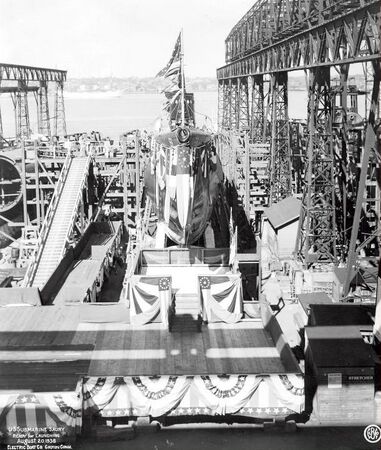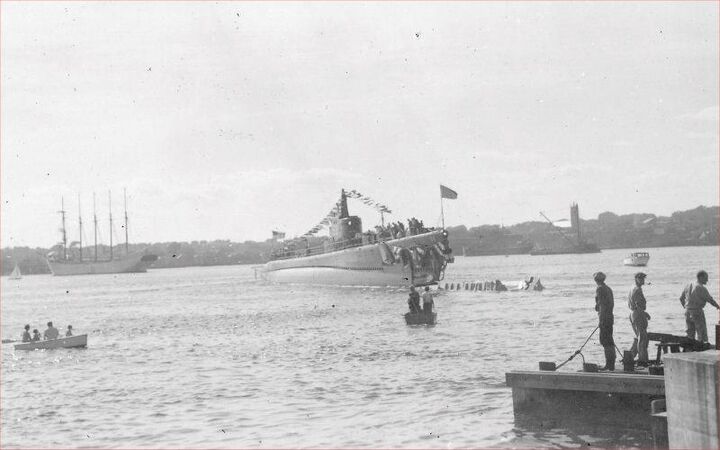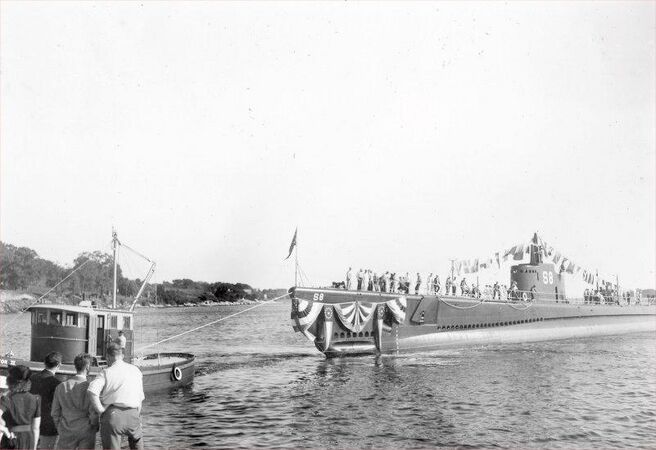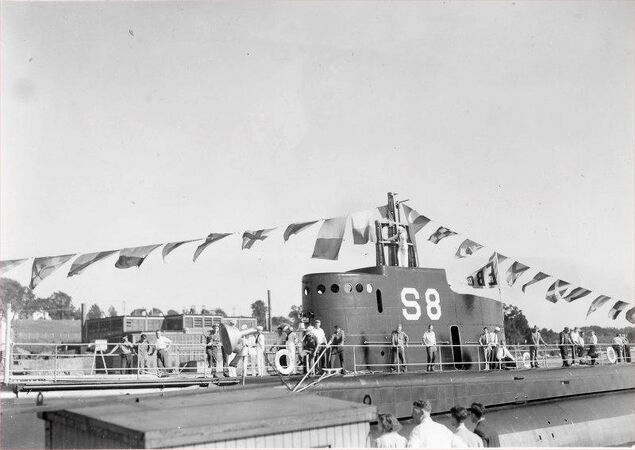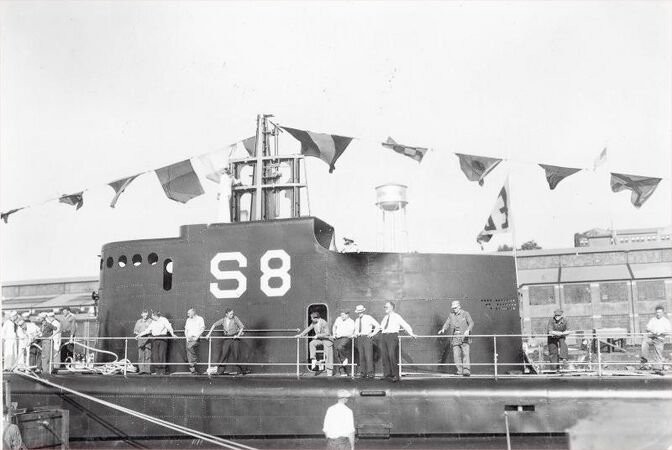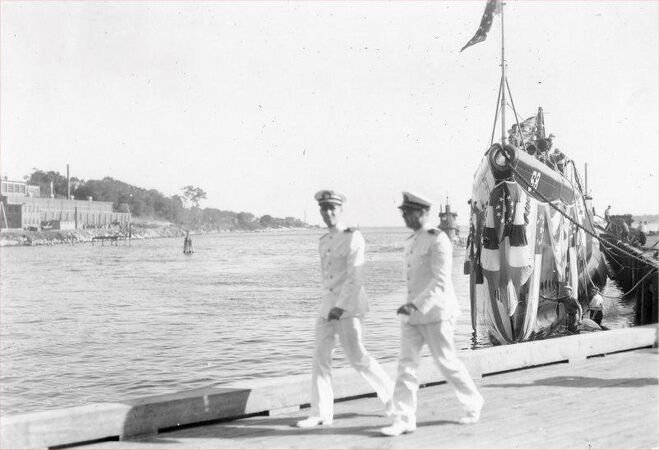189
Under Construction
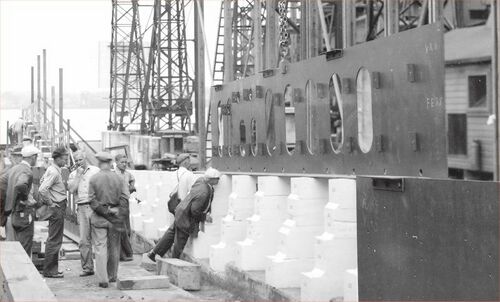
Photo courtesy of the Submarine Force Library & Museum.
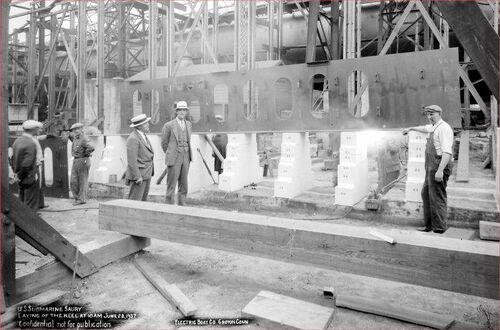
Another view of the Saury keel laying on June 28, 1937 at Electric Boat.
Photo courtesy of the Submarine Force Library & Museum.
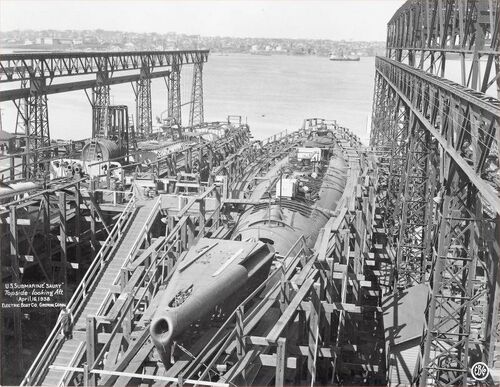
Saury under construction at Electric Boat, April 16, 1938. The bow buoyancy tank has been installed, but none of the superstructure or the conning tower is yet in place. The EB design for this class introduced the faired in bullnose to the very tip of the bow. In the Government design it was still an above deck ring style bullnose.
The boat on the left in the photo is the further along Sargo (SS-188). Sargo's conning tower has been installed, along with the support beams for the periscope shears and much of her superstructure.
Photo courtesy of the Submarine Force Library & Museum.
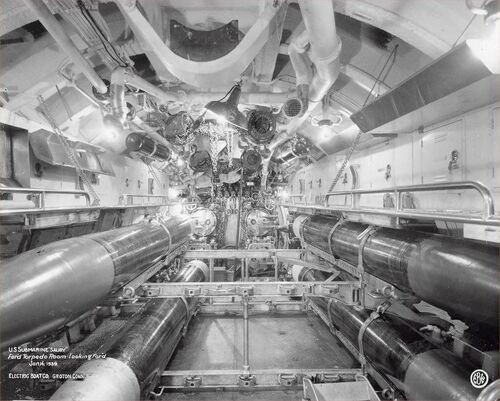
This next series of interior photos were taken at various time during the construction process and are arranged forward to aft. They are out of date sequence and show the boat in various stages of construction. This view is of the forward torpedo room on January 14, 1939 about four months prior to her commissioning. The bars between the torpedo racks were removable and were put into place to allow the movement of the reload weapons so that they could be lined up with the tube.
Photo courtesy of the Submarine Force Library & Museum.
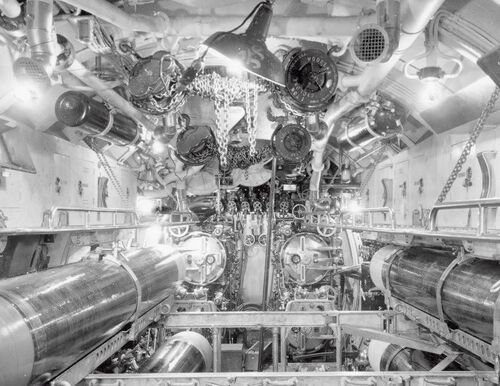
A closeup of the photo above showing details of the breech doors of the tubes. Chain hoists are in the overhead to facilitate the movement of torpedoes.
Photo courtesy of the Submarine Force Library & Museum.
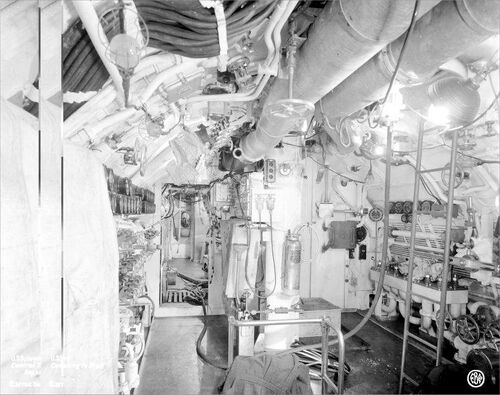
Saury's control room looking aft and to starboard in the fall of 1938. The ballast trim manifold is on the right.
Photo courtesy of the Submarine Force Library & Museum.
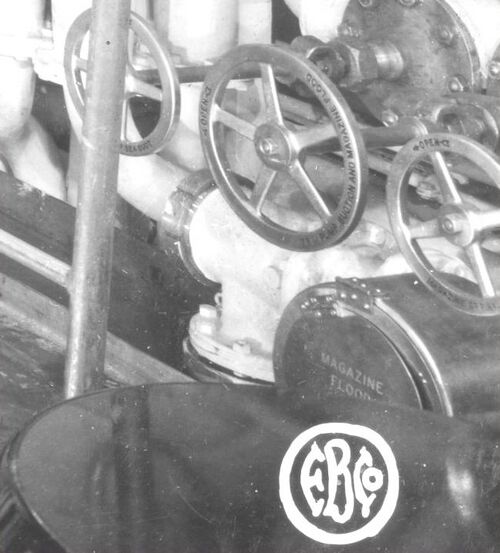
A closeup of the photo above showing valves used pump or flood various spaces.
Photo courtesy of the Submarine Force Library & Museum.

Saury's forward engine room looking forward on April 2, 1938. This is early in the construction process. These two engines are her generator engines. The two main propulsions diesels are in the after engine room.
Photo courtesy of the Submarine Force Library & Museum.
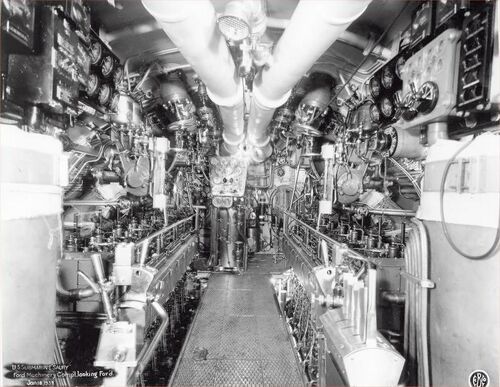
The same view as the photo above, except on January 18, 1939. The room is now essentially complete. The difference is dramatic.
Photo courtesy of the Submarine Force Library & Museum.
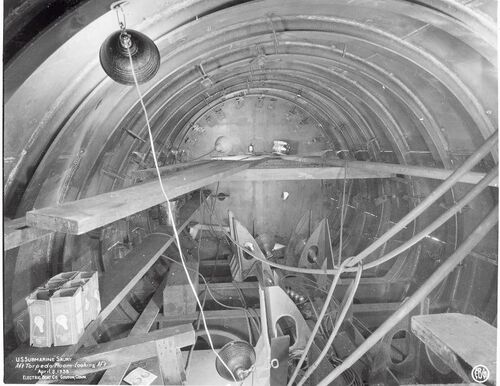
Saury's after torpedo room looking aft, April 2, 1938. Very little equipment has been installed. The torpedo tubes will eventually penetrate that bulkhead where the smaller holes have already been drilled.
Photo courtesy of the Submarine Force Library & Museum.

The same view four months later. The tubes have now been installed where the small holes where. The access hatch to the main deck can be see in the upper center, and the torpedo loading hatch is in the upper foreground center. Much more work remains to be done.
Photo courtesy of the Submarine Force Library & Museum.
Launch Day
Photos courtesy of the Submarine Force Library & Museum
Fitting out at Electric Boat
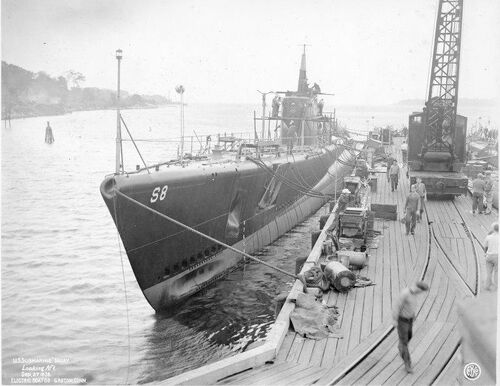
Photo courtesy of the Submarine Force Library & Museum.
Sea Trials and Pre-commissioning
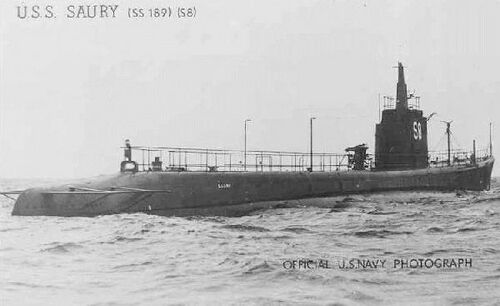
U.S. Navy photo.
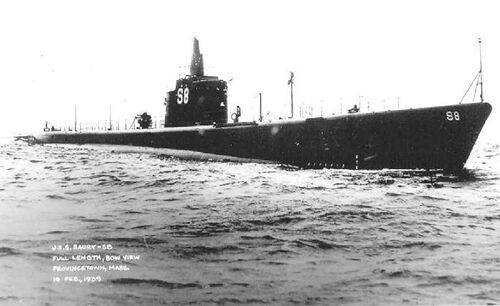
Another view of Saury on her trials on February 10, 1939. These two photos were been taken near the measured mile in Cape Cod Bay of Provincetown, MA.
U.S. Navy photo.
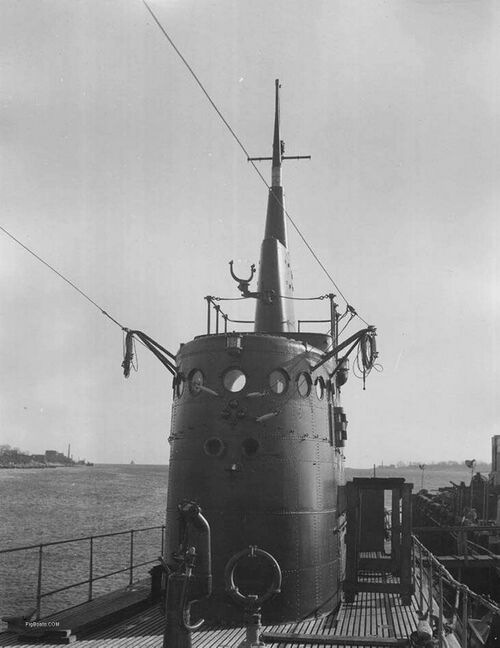
Saury after her return to the Electric Boat Company piers in Groton CT. at the conclusion of her sea trials, February or March 1939. She is undergoing work to correct any deficiencies that turned up during the trials and is being prepared for acceptance by the Navy. This view is of her conning tower fairwater. In the foreground is the hook-shaped mount for a Browning M2 .50 caliber machine gun. The gun is dismounted and taken below when not in use. Next to it is the circular antenna for Radio Direction Finding (RDF) equipment. Above and on the forward edge of the fairwater are two circular horns for the air whistle. Numerous windows for the pilothouse are visible. Advances in radio technology have reduced the number of radio aerial wires, but two of them can be seen supported by stanchions on either side of the pilothouse. The empty U-shaped bracket on the front of the periscope shears is for a signal/search light.
U.S. Navy photo courtesy of Navsource.org.
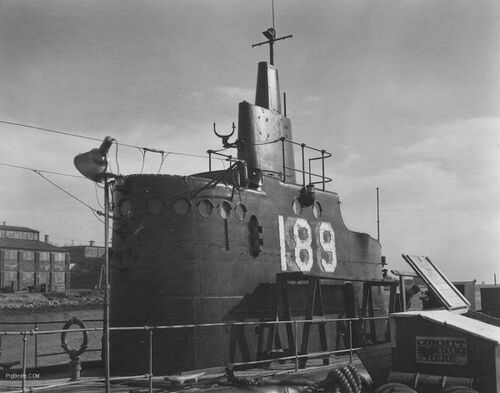
Saury was undergoing sea trials when the Navy shifted away from the class identifiers in favor of standardizing on the hull numbers. A work platform has been erected so that the numbers can be changed. The numbers were outlined by weld beads that enabled a consistent and uniform style each time it was painted. In this case the beads have been ground down on the S8 and white templates have been installed for the hull number.
U.S. Navy photo courtesy of Navsource.org.
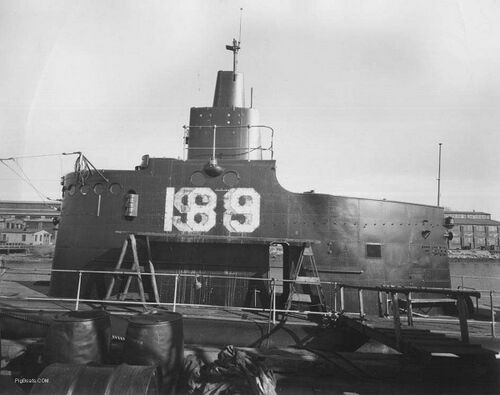
Another view showing the number conversion going on. The process of grinding off the weld beads for the S8 has caused the paint to run down the side of the fairwater. This will all be cleaned up when the work is completed. Note that on the EB design for this class there are two additional circular windows in the side of the fairwater above the numbers. These unnecessary features would be done away with once the war started.
U.S. Navy photo courtesy of Navsource.org.
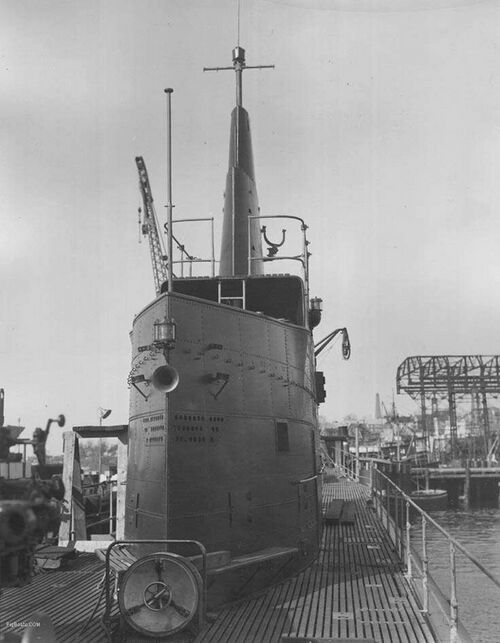
This view of Saury is of the aft end of the conning tower fairwater looking forward. The after battery hatch is open leading down to crew's berthing and messing areas. This hatch is a center-line hatch that was moved in later classes of sub's to the starboard side to free up space on the interior. Note the benches at the aft of the fairwater. The peacetime Navy allowed for such luxuries for the crew to relax while taking a break topside on the surface. When war broke out these amenities were removed as unnecessary. Seen running around the sides of the fairwater are hooks for rigging a deck awning.
U.S. Navy photo courtesy of Navsource.org.

A nice view of the aft end of the conning tower fairwater looking forward. This area was known as the "cigarette deck", as it was a good spot to go topside and catch a smoke. In the foreground is a mount for a Browning M2 .50 caliber machine gun. To give the gunner adequate space to move around while operating the gun the bulwark railing is bulged outward on each side of the gun mount. Further forward on either side of the periscope shears are lookout platforms surrounded by railings. Below this you are inside the pilothouse which extends forward to the surface helm station.
U.S. Navy photo courtesy of Navsource.org.
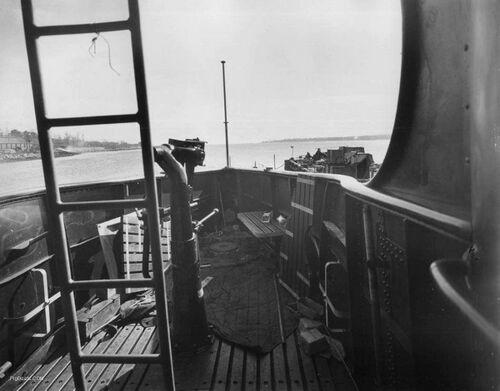
In this photo the photographer has moved forward and turned around. This is the cigarette deck looking aft from inside the pilothouse. The .50 caliber gun mount is in the center. Work remains to be done to clean up this area before commissioning.
U.S. Navy photo courtesy of Navsource.org.

A very interesting view of Saury's pilothouse showing the topside helm station. This area would all free-flood when the boat was submerged. To the left of the wheel are the engine order telegraphs that allow the helmsman to send speed orders back to the maneuvering room. In front of the wheel are the rudder angle indicator and the gyrocompass repeater.
U.S. Navy photo courtesy of Navsource.org.
Later career
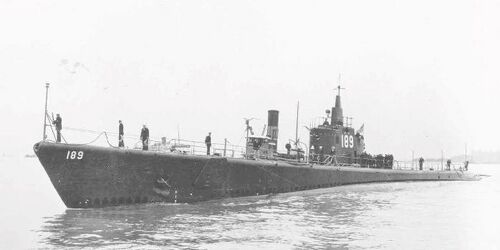
As part of her post-commissioning shakedown cruise, Saury visited New York City for attendance at the World's Fair. She is shown here on April 29, 1939 preparing to moor. She has only been in commission for 26 days. There is a small tugboat behind her to assist in mooring.
U.S. Navy photo, a copy is in the private collection of Ric Hedman.

This is the Japanese aircraft ferry Kanto Maru going down after being hit by Saury's torpedoes on September 11, 1942. This was the first of five sinkings by Saury during the war. She was under the command of LCDR Leonard S. Mewhinney at the time.
Photo courtesy of the Submarine Force Library & Museum.
Page created by:
Ric Hedman & David Johnston
1999 - 2023 - PigBoats.COM©
Mountlake Terrace, WA, Norfolk, VA
webmaster at pigboats dot com

